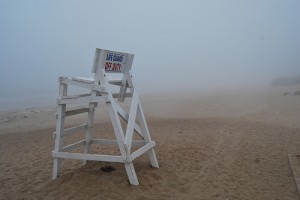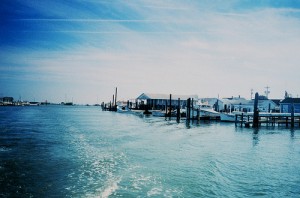Book Review: Off Season, Discovering America on Winter’s Shore
A vision of the coastal towns is with summer in full shine, seagulls and minivans plying the shore. In the south there is fried fish. In the north there is saltwater taffy and boardwalks. All along, the city folk have built beach houses here, to rent out to strangers or to share with friends in summer. But it is the locals who run the coast when the tourists leave for the summer. When winter rolls in, the pace slows as the ice chokes the harbors, and the towns are left for those who enjoy the solitude. This is Off Season, not Jersey Shore.
In Off Season, Ken McAlpine spent a winter driving the east coast from Florida to Maine seeking stories of small town life. Whether or not we come from small towns, we want to believe in Mayberry. McAlpine’s journey recalls William Least Heat Moon’s classic Blue Highways, a road trip through small-town America. “Life doesn’t happen along the interstates,” he wrote, “It’s against the law.” McAlpine’s story is similar, that the best stories happen when the tourists pack up at Labor Day or Thanksgiving, and the small coastal towns are left with the locals, usually friendly, but still a bit suspicious of an outsider with a pen.
McAlpine escapes the trap of many writers who share with their readers blow by blow accounts of breakfasts, lunches, dinners, and ad nauseum accounts of mile markers and highway signs. Instead, he stops for several days in small towns, like Tangier Island, Virginia, and Valona, Georgia, spending time with the fishermen, walking the deserted beaches, finagling invitations to coffee. I only know about a few of the destinations in the book, as the rest are off the tourist trail, left to those who spend their days here by the sea.
These searches for the faces behind the towns reveal locals who lose their minds day by day, but they lose their minds among friends. Some lose their lives in fishing accidents, and there is no shortage of tragedy along the coast. In nearly every town, there is a tale of someone lost at sea. Some lose their livelihoods, as making a living from the sea requires permission from the sea itself, and if she does not wish you to have bounty from her waters, she will let you know. The fishermen themselves come across as a mixed bag. They are each other’s protectors and enemies, with McAlpine relaying tales of noble gentlemen dropping their catch to help a friend in danger, but also of skirting regulations to get in another catch, laws and overfishing be damned.
However, the book is not about tragedy, but real life as it plays out. On Okracoke Island, he watches the last of the summer homeowners close up their houses for the winter, as he settles into the routines of the island, as experienced by islanders. Along the journey, he visits with stubborn old codgers, and those dedicated to coastal preservation. He listens to locals boast of their rising property values, simultaneously asserting that they will never move. And we believe them, for those who didn’t want to stay have already cashed in.
 In Rhode Island, he surfs the near frozen ocean with Peter Pan, a legendary cold water surfer. He is among those who could imagine living nowhere else. And the road trip ends on an island in Maine, where a 78-year old lives with his wife in a log cabin they built, heated by a fire, and with an outhouse in back. These are those who are keeping the coast alive. Aside from passing references to the summer being entirely different, he doesn’t talk much about the tourists at all, for this book is not about them.
In Rhode Island, he surfs the near frozen ocean with Peter Pan, a legendary cold water surfer. He is among those who could imagine living nowhere else. And the road trip ends on an island in Maine, where a 78-year old lives with his wife in a log cabin they built, heated by a fire, and with an outhouse in back. These are those who are keeping the coast alive. Aside from passing references to the summer being entirely different, he doesn’t talk much about the tourists at all, for this book is not about them.
Among travel memoirs which try to take us too far away, McAlpine takes us faraway to the present. His tales give us a reason to believe in Mayberry and make us want to be part of a community again.
Book Review of Ken McAlpine, Off Season, Discovering America on Winter’s Shore. 2004, one of the best travel books of all time.

